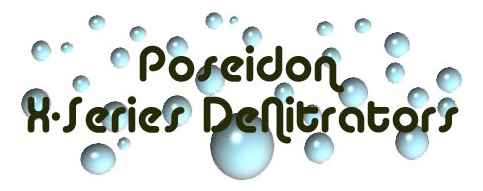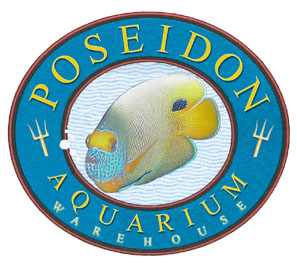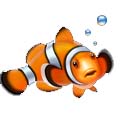Poseidon X-Series DeNitrators are highly efficient and economical nitrate reduction filtration systems designed to remove nitrates from the aquarium using a natural anaerobic denitrification process. The X-series denitrators ARE NOT coil denitrators. Coil denitrators produce sulfuric acid and sulfide gas byproducts that are toxic to animal life. A simple and safe reaction of Carbon Dioxide and Water are the main derivatives for the X-series denitrators with no harmful side affects. The X-series denitrators house an enormous surface area for denitrifying bacteria to thrive on. In addition, a specially designed bioplastic media (included) feeds the bacteria for a period of up to 18 months!
During this time no extra feedings are necessary!
Some DeNitrators require dangerous alcohol feedings to boost the levels of anaerobic bacteria within their chambers. This can have an adverse effect by vastly increasing the levels of harmful aerobic type bacteria leading to harmful pathogenic effects (Coral Bleaching, Cyanobacteria) as well as dangerous levels of phosphates and sulfide gas byproduct.
After the initial 18 month period, the media in the X-series denitrator does not necessarily need changing unless the nitrate levels start creeping up again.
These filters can be used safely on all Freshwater (including Planted Aquariums) as well as Saltwater Aquariums (especially Reef Systems). Using a X-series denitrator will reduce the amount of water changes on your system saving you both time and money - and a resulting clean and healthy environment for your underwater friends.
Nitrates in the aquarium can be controlled by frequent water changes, along with limiting the biological load and excessive feedings. A well vented wet dry, or biological filtration system will detoxify ammonia before it breaks down into nitrate. Utilizing chemical filtration, and protein skimming, will also limit nitrate levels.
Systems with excessive nitrates tend to have similar characteristics which may include one or more of the following:
a) Use of chlorinated tap water. There are high traces of chlorine, chloramines, ammonia, fluorine, and other toxins
found in tap/city water. There is also an over-abundance of minerals and metals (some harmful) found in tap
water as well. The aquarist will use a water conditioner to neutralize the harmful chlorine, chloramines, and free
ammonia that can kill fish instantly, but does not realize this conditioner is also compounding the heavy metals and
minerals from the tap water that do not get "removed" by water conditioner. Consequently, the water
conditioner itself (after detoxification occurs) leaves a residual binded non-toxic compound that inevitably gets broken
down within the biological food chain of the aquarium. The excessive buildup of minerals will form algae and
increase nitrate levels as they get broken down. One very simple method to avoid this is to use filtered water
or reverse osmosis water. Using RO water along with the proper buffering agents will help keep you nitrates low.
b) The type of food used by the aquarist can cause nitrate issues. Besides overfeeding (which is a given), the quality of
the food given to the fish plays a major roll with nitrate issues. Food that has filler ingredients should be avoided. These
fillers break down faster than the fish can eat and just become another mineral supplement for the aquarium biological
food chain to break down. Use high quality frozen, pellets, as well as flake for feeding. Do not overfeed.
c) Excessive biological housing. The total biological housing capacity (live rocks, bio balls, bio-media, sand/gravel)
minus the total amount of biological matter (fish, plants, corals, inverts) equals the nitrates formed. It is a simple
equation that requires lots of checks and balances to keep nitrates low. The live animals in your tank will eat, and
produce waste in the aquarium. The biological food chain which consists of bacteria, eats the waste and eventually
converts it into a less toxic form, nitrogen gas. The bacteria cannot live without waste, and likewise the live animals
cannot live without the bacteria cleaning up after them. Systems that are overstocked with live animals and do not have
enough biological housing will experience nitrate issues. Similarly, systems that have high amounts of bio-media and are
not that heavily stocked with live animals can experience nitrate issues as well.
d) Anaerobic bacteria presence. Bacteria lives and dies on a constant basis and its population changes every day in the
aquarium. One type of bacteria that eats up nitrates is call anaerobic bacteria. This bacteria does not like the
presence of high oxygen concentrations. Systems that tend to over filtrate have a tendancy to not have an abundant
amount of this type of bacteria that helps reduce nitrates. Biological filtration usually forms the oxygen liking aerobic
bacteria which detoxifies ammonia and nitrites quite efficiently. However, its byproduct (nitrates) remains in the
system for the slower anaerobic bacteria to take care of.
The X-Series DeNitrators are very compact in size and will fit under your aquarium cabinet (for individual sizes, please see the specific denitrator model). The filters promote the growth of anaerobic bacteria by creating an enormous surface area for the bacteria to live and help sustain it with a specially designed biological carbonate food source (included). There are no extra feedings required.
The X-series denitrators safely and effectively accelerate the reduction of nitrates into nitrogen gas. They can maintain LOW to NO Nitrate levels for many months before media exhaustion.
Replace media (with Denitrification media packs) after nitrate levels begin fluctuating to higher than normal again.
The media usually does not need replacement for over 18 months!
Please visit the individual DeNitrator (X-1, X-2, X-3 ) and instruction guides for more information regarding the product.


